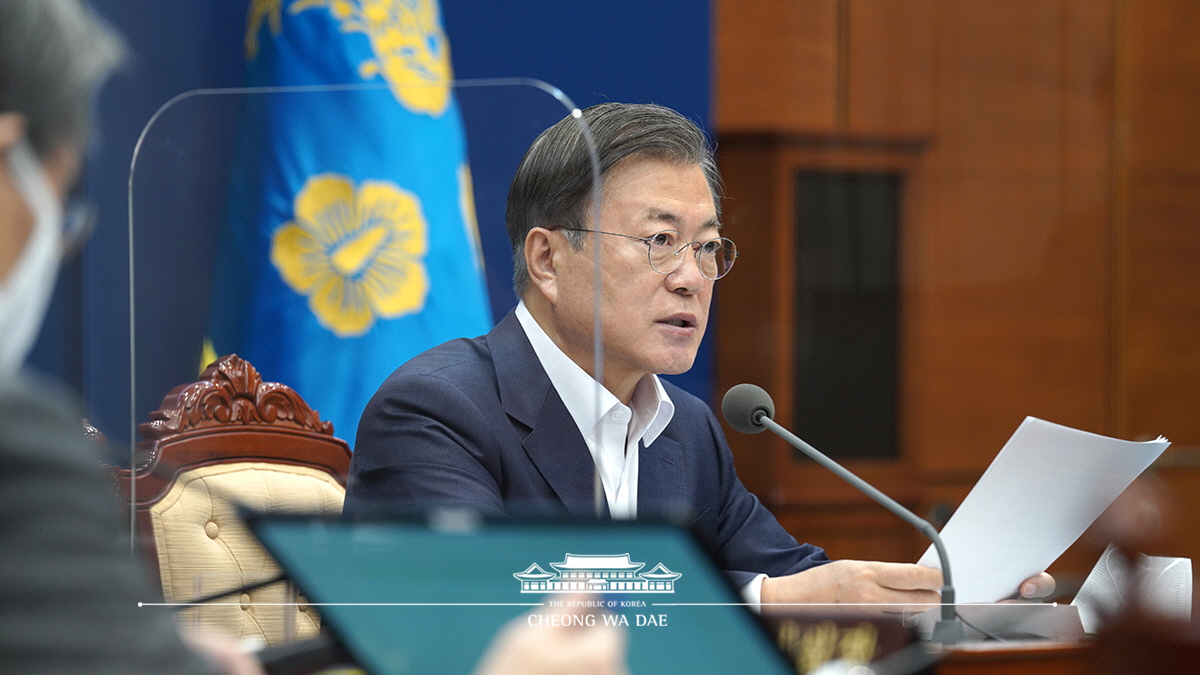이 웹사이트는 제19대 대통령 임기 종료에 따라 대통령기록관이 「대통령기록물 관리에 관한 법률」에 의해 이관받아 서비스하는 대통령기록물입니다. 자료의 열람만 가능하며 수정 · 추가 · 삭제는 불가능합니다.
다만, 「개인정보보호법」에 의하여 개인의 정보를 보호받기 원하시는 분은 관련 내용(요청자, 요청내용, 연락처, 글위치)을 대통령 웹기록물 담당자(044-211-2253)에게 요청해 주시면 신속히 검토하여 조치해 드리겠습니다. 감사합니다.
SPEECHES & REMARKS
BRIEFINGS

Let me begin the 53rd Cabinet Meeting.
Viruses do not discriminate against people, but the social and economic crises caused by infectious diseases are not equal for everyone. Disasters descend upon the weak first and are bound to be even harsher on them. This is the reason why we must focus in particular on protecting the socially vulnerable in response to the crisis caused by the COVID-19 outbreak.
The Government has implemented policies to actively protect those who are most vulnerable to the COVID-19 crisis. We have intensively carried out policies that aim to expand employment and social safety nets to prevent the crisis from aggravating inequalities. We have provided emergency relief payments, subsidies to employers for retaining jobs, a special one-time allowance for young job seekers and a new hope fund for microbusiness owners. Unprecedented policy measures have been mobilized across the board, including the expansion of the list of those eligible for basic living security benefits. As a result, all income quintile groups saw their incomes rise in the second quarter, and the incomes of lower quintiles increased even faster than the others – a desirable phenomenon that shows improvements in the distribution index.
Oxfam, an international relief organization for the poor, has recently named Korea as an excellent example of successfully handling COVID-19 responses while reducing inequalities. In Oxfam’s Commitment to Reducing Inequality Index, Korea ranked 46th out of 158 countries, a ten-notch increase from two years ago. That is still far from sufficient, but the country’s big jump in the ranking indicates that the international community has positively assessed our Government’s efforts to rectify inequalities.
We, however, still have a long way to go. We cannot let this end as a fleeting improvement fueled by government subsidies during a time of crisis. Inequalities caused by COVID-19 continue to threaten the lives of people in a wide range of areas. A case in point is the newly emerging unequal structure of the labor market. COVID-19 is driving the contract-based self-employed and others who fall through cracks in the existing system to the brink.
Couriers dying from overwork one after another are a vivid example. I particularly urge you to speed up devising countermeasures to prevent any more of such unfortunate incidents from occurring. The Government has continued efforts to expand employment insurance coverage and begun to make the contract-based self-employed, freelancers, artists and similar workers eligible for emergency employment support. However, much more remains to be done still. What we need are institutional protections that go beyond temporary support. To clearly reduce these blind spots, I urge the Government to further strengthen labor oversight and onsite inspections at places with poor working conditions and to establish sustainable measures.
I ask you to pay special attention as well to non-permanent female workers who have no other choice but to continue face-to-face work even in the COVID-19 situation. Non-permanent workers, such as caregivers for the sick, certified nursing assistants, after-school teachers, housekeepers and babysitters – who are predominantly women – are exposed to the risk of a COVID-19 infection. They also suffer significantly in economic terms since COVID-19 has reduced the number of jobs available. I urge you to examine the policies designed to ease their pains and formulate necessary support measures.
Addressing childcare and education inequalities caused by COVID-19 is also an important task. Meticulous and elaborate policy efforts are required to ensure that income gaps do not lead to gaps in childcare and education. Given the prolonged COVID-19 pandemic, there is a particular need to enhance the overall childcare system. I ask related ministries and agencies to quickly devise plans to improve the childcare system during pandemics.
Meanwhile, there is a need to pay special attention to the most marginalized in our society. We have heard the tragic news about three individuals with developmental disorders falling to their deaths within a short period of time. They had nowhere to go because they were in self-quarantine over the past two months or because welfare centers were temporarily closed. The lack of timely personal care due to social distancing guidelines is being blamed as the cause.
Another serious problem is the sharp increase in the number of lonely deaths this year. Recipients of basic living security support account for more than half of these deaths. This is also being blamed on face-to-face services not being carried out properly since preventing the spread of the infectious disease has been the main focus. These deaths happened because those who should have been better protected found themselves instead in blind spots as epidemic prevention and control measures were prioritized. I urge you to thoroughly examine the situation and quickly devise necessary measures.
The more difficulty there is, the closer each ministry and agency should move toward the people to find answers on the ground. The pain caused by COVID-19 does not weigh on everyone equally. As a reliable Government that safeguards the lives of the people, I ask you to carefully, with warm hearts, look after those enduring greater difficulties due to COVID-19.



